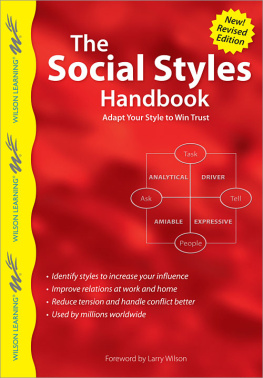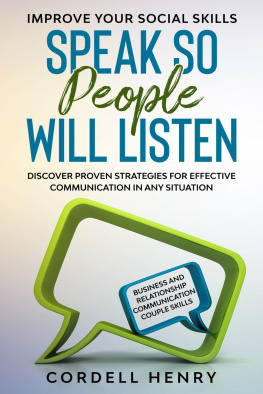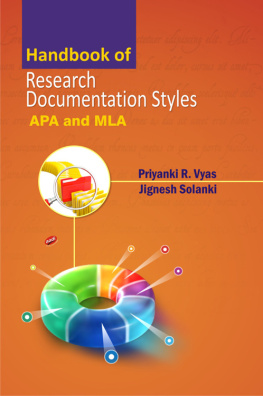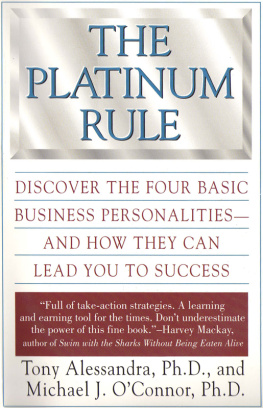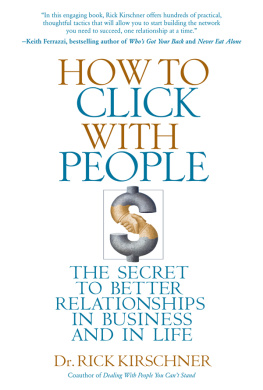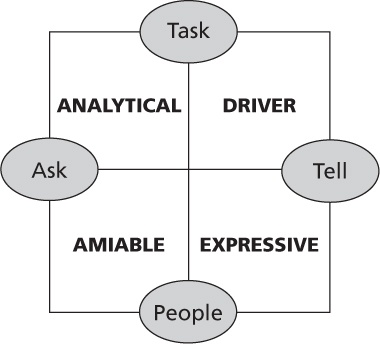The Social Styles Handbook: Adapt Your Style to Win Trust
Wilson Learning Library
Published by Nova Vista Publishing
Foreword
We all know of distinguished doctors whose terrible bedside manners devastate their patients. Or of geniuses in strategic planning who cant inspire anyone to follow their lead. And sadly, we all know partners who give up on love because they can no longer relate to one another. What a waste in human potential!
Does this have to be? Daniel Golemans groundbreaking book Emotional Intelligence described this waste, in detail. He argued the cause is a lack of Emotional Intelligence, or EQ as important as IQ. Only one problem: Daniel didnt tell us how to improve our EQ.
Dont despair: The Social Styles Handbook has all the how-to answers Daniel left us wondering about, in an easy to understand format. All you have to do is bring your learning attitude.
I believe that weakened or broken relationships are caused by differences in expectations. Think about that for a second now, as it relates to your own relationships at work and at home. In my case, I realized I was so stuck in meeting my expectations that I seldom considered the other persons. Ouch! My low EQ kept me from having the strong, productive relationships I wanted.
Then I discovered Social Styles, and I got better. My IQ didnt change, but I upped my EQ. I found more success and fulfillment. You can too.
So learn how to be with others by meeting their expectations, making them feel comfortable, and dealing with them on their terms. Discover Versatility and the power it brings to your relationships. Learn how to adapt your behavior to the Social Styles of people you want to relate to most.
After youve read and applied The Social Styles Handbook, youll see relationships improve and be more fulfilling, and successes come more easily. If those rewards match your expectations, you wont be disappointed. Youve already won!
Larry Wilson
Social Style and Versatility
Analytical | Driver |
|---|
| Focus on results Take charge Make quick decisions Like challenges
|
Amiable | Expressive |
|---|
| Create excitement and involvement Share ideas, dreams, enthusiasm Motivate, inspire, persuade
|
Research and profiles of more than two million people around the world by Wilson Learning indicate that people fall into one of four Social Styles in terms of their comfort zones of behavior. Roughly 25 percent of the population falls into each group.
Part I. Section 1 The Case for Communication
Chapter 1. Introduction
The pure and simple truth is rarely pure and never simple.
O SCAR W ILDE
Think about the most important things going on in your life right now. Are you job hunting? Vying for a promotion? In a tough situation with a client, boss or co-worker? Looking to get someones help, or create a great first impression with someone important? Are you just trying to understand someone whos really different from you? Wondering why in such everyday situations sometimes you seem to excel, and at other times unravel?
Think communication. Think relationships.
Strong interpersonal skills wont get you a job for which you have no technical expertise (although we all probably have a story or two to the contrary). Youre just as unlikely to get a position for which you are technically qualified, however, if you dont connect on a personal level with a potential new boss. In the big picture of human transaction, people wont buy from you, be influenced by you, or collaborate with you if they arent comfortable with the way you come across personally and professionally. There are too many choices in the marketplace for most people to be willing to endure excessive tension in professional relationships. Life is too short to spend it working and doing business with people who stress us out.
To get ahead, it helps to get along, and the underpinning of getting along building strong relationships is good communication. Its as simple as that. And its as complicated as that.
Simple? There is essentially no limit to the number of ideas or propositions that we can convey using sentences, writes Michael Corballis in American Scientist magazine. Corballis, a professor of psychology at the University of Auckland in New Zealand, is a noted researcher and author in the area of the origins of language.
Complicated? The remarkable flexibility of human speech, Corballis says, means people can immediately create sentences made up of words perhaps never used in combination before. Language also allows us to escape from the immediate present and refer to events in other places and at other times, he says. We can use language to fantasize, to describe events that have never existed and never will.
See where things can start to get thorny?
Words Arent the Key
Further complicating communication, of course, is the research that shows communication the transfer of information is based only in small part on the words we use. Albert Mehrabian, professor emeritus at the University of California in Los Angeles and the author of Silent Messages: Implicit Communication of Emotions and Attitudes, determined that the effectiveness of communication is based on these three factors:
7 percent of the effectiveness of communication is based on the meaning of the words we use.
38 percent of the effectiveness is based on the way we say the words we choose.
55 percent of the effectiveness is based on nonverbal cues, such as facial expressions.
Although Mehrabians research was done back in the 1970s, this insight about the disproportional importance of tone of voice and nonverbal signals in communication still surprises many people today. Communication is far trickier than the mere passage of words from one persons lips to another persons ears. Talking is much easier than conveying message and meaning clearly.
Communication is perhaps the most complex thing humans do. It also is arguably the most critical skill for thriving and surviving in just about any situation short of being stranded alone on a desert island. Thats why the work of trying to uncover the secrets, mysteries, tips, and tactics of effective communication is an industry unto itself. A search on the Internet for Web sites and resources related to the word communication turns up 28 million hits in 0.65 seconds. Refine the search by adding the word skills and the number of hits is still 4.3 million. Searches at online booksellers Barnes and Noble and Amazon.com turn up between 35,000 and 62,000 references for books, videos and other learning materials in English.
With all the information about communication thats so readily available, and the prospects that about a million things can go wrong in even the simplest relationships, you may be worrying youll need your own Ph.D. in psychology to understand what it takes to communicate skillfully. The good news is that

